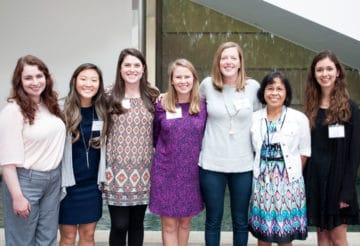Scientist and Mentor: Dr. Marlee Marsh ’02

Marlee Marsh ’02 was the first student at Converse to participate in SCICU-funded independent research under the mentorship of Dr. Edna Steele. Now Associate Professor of Biology at Columbia College researching environmental immunology, she’s mentoring a new generation of young female scientists. Together they are studying how changing environmental conditions impact the ability of fish to respond to disease.
“There are just so many unanswered questions in the world of biology. Particularly in my area of science. A lot of waste ends up in our waters, and we don’t know everything about what impact that has on the organisms in these environments. We’ve barely scratched the surface. There are a lot of very eager young scientists who can help us solve these problems, or help obtain information to get them solved. And they get inspired in the process.”
“There are just so many unanswered questions…”
Converse’s research program provides the opportunity for undergraduates to be paid to conduct front-line original research. Most students at larger institutions don’t get chances like this before graduate school. Converse’s student researchers present their work to peers, professors and fellow scientists, traveling in-state and sometimes to national conferences.
“It’s an experience you may not even know you want,” said Dr. Marsh. “A lot of times students, particularly women, think they aren’t smart enough or good enough. Doing independent research builds confidence, develops research skills, and it can be the start of your career. It opens doors and pekes professional interest.”
 Drs. Marsh and Steele with their SCICU student researchers.
Drs. Marsh and Steele with their SCICU student researchers.
Dr. Marsh recently reunited with her mentor, Dr. Edna Steele, as both professors brought students to present at the South Carolina Independent Colleges and Universities (SCICU) Research Symposium.
“I would not be where I am today if it weren’t for . I wasn’t considering being a college professor, but Dr. Steele encouraged me to research with her over the summer. Because of it I went to grad school and learned that I enjoyed teaching. I ended up doing what she’s doing, at a women’s college teaching and mentoring young scientists. I still consider her a mentor and we correspond regularly.”
Dr. Steele was proud to see her protégé’s students carrying on the lineage of mentored research.
“Alumnae like her are how I measure my success.”